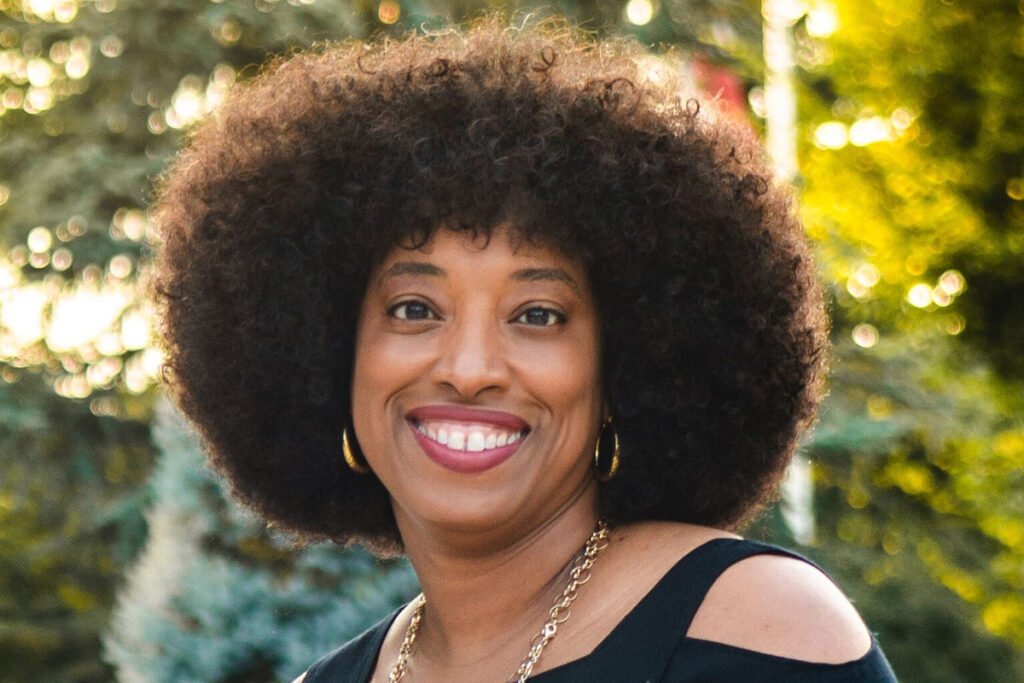Antiracist Faith Leader Shares Lessons in Intersectionality

Yavilah McCoy, CEO of Dimensions, a diversity consulting group led by women and Jewish people of color. She is a renowned national speaker and educator, and a pioneer of the Jewish diversity and equity movement, named one of “16 Faith Leaders to Watch” by the Center for American Progress.
McCoy was invited to deliver the keynote speech for this year’s Social Justice Academy, an initiative of Intercultural Student Affairs and the Center for Spiritual Life, with a theme this year of intersectionality in social justice. On April 12, McCoy led a series of workshops on incorporating intersectionality into movements for BIPOC students, Jewish students, and faculty and staff. On April 13, she spoke to the Emerson community on “Deepening Equity and Justice Across Intersections of Racism and Antisemitism.”
On Intersectionality by Way of Physics:
According to Newton’s third law of motion, whenever an object A interacts with an object B, they exert forces upon each other. And as these forces engage, a third, separate force always manifests as a result of this engagement. Interesting.
In other words, Newton’s third law of motion is teaching us that in any interaction between contradictory forces, there is a yearning force, there is an opposing force, and there’s a reconciling force. And there’s the intersection of these three forces working together that creates something new.
…
We [at Dimensions Educational Consulting] are considering … the lens of Newton’s law and what it has to teach us about there actually being some hope in the amount of conflict, resistance, frustration, and opposition that is often generated by the experience of teaching others about the experience of ‘isms. ’It’s teaching us to be hopeful that this bumping into and against each other and exploring each other’s lived experiences, that we are essentially creating new paths for new things to happen.
On the Work Ahead
The work that we have to do is going to help us to dismantle confusion. But in order to do that, we have to see this work as being intersectional, as having something at stake for all of us. And in order for that work to have something at stake for all of us, we’re going to have to ask ourselves some tough questions. We’re going to have to ask ourselves, what does it mean when we find that we are more threatened by people’s words and ideas describing the nature of their oppression than we are by the ongoing existence of oppression itself?
…
If we are committed to dismantling ‘isms,’ like racism and antisemitism, and the multiple isms that plague our society, we have a long road ahead. And some of that road includes our commitment to educating ourselves, our commitments to having tough conversations, our commitment to taking action together to move forward toward alternative outcomes, to lean into messy and uncomfortable work, and to seek that third force of Newton’s law.
Four Ways to Check Yourself Around Allyship
Check yourself on whether you’re performing your allyship or actually deeply integrating it within your daily behaviors.
Check yourself on whether you have become comfortable with platitudes. Platitudes means I’m able to put a Black Lives Matter sign on my front lawn or on a T-shirt, but that’s the extent to which I have become engaged in the work of anti-racism. That would make it a good thing to say, but it would make it empty if it’s not backed up with deep reflection, discovery, and alternative behavior that you engage in to be able to make change in systems.
A third way in which I would do a check on yourself is, [ask yourself] ‘Is my approach to dismantling isms in systems about my position and about my title, or is it about my way of life, my way of being, and my lifestyle?’ A title does not necessarily make you antiracist or a person who’s dismantling antisemitism. If it’s just your title and your academic title that actually helps you to feel connected to this work, what lives beyond that?
And the last place in which I’ve asked people to check themselves on campus is, are you engaging in perfectionism? Is it possible that you’ve told yourself a story that, if I don’t get this exactly right every time, if I don’t have the exact right language, if I don’t have the perfect way to respond, I’m OK to give myself a pass to be silent? … The work of dismantling isms is messy, and it’s going to call you to be courageous, to being vulnerable while still being authentic. So, I tell people to give up the perfectionism and to find a way to be able to tell folks the ‘I’ story of what this work has to do with you, and the ‘I’ story of where you are in the process, and the ‘I’ story of why there’s something at stake for you, even though you may not even be sure what the next thing is.
Categories